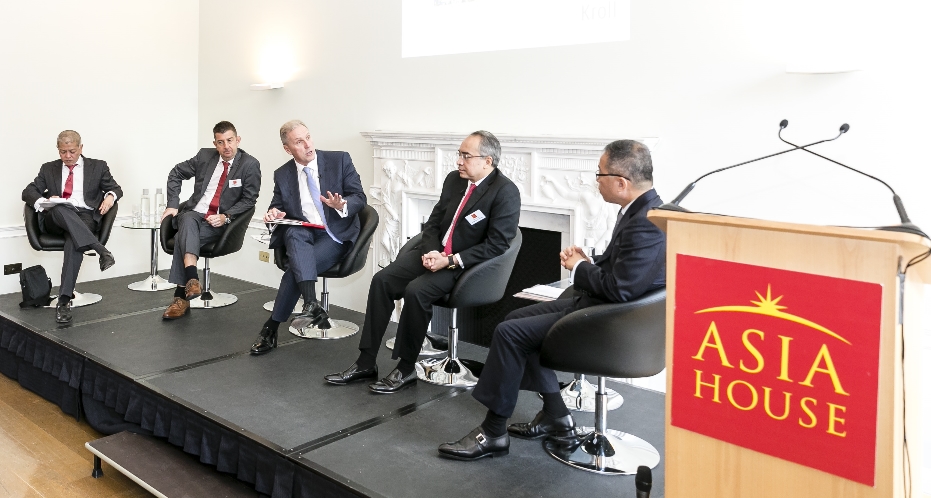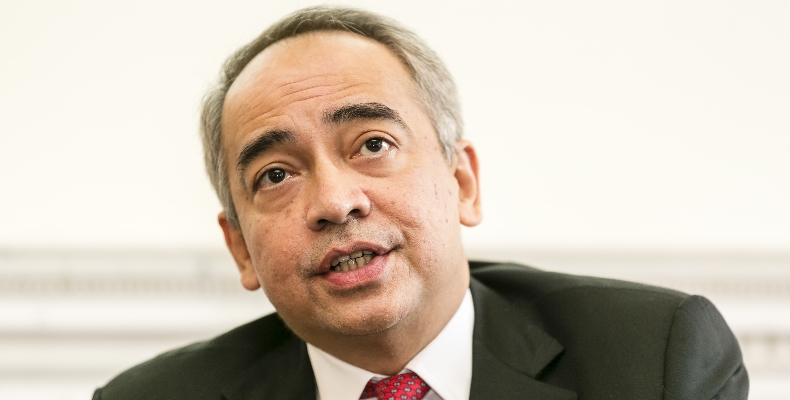Driving commercial and political engagement between Asia, the Middle East and Europe
Driving commercial and political engagement between Asia, the Middle East and Europe
Driving commercial and political engagement between Asia, the Middle East and Europe

The prospects for the Philippines, Cambodia, Laos and Vietnam look bright but political problems and corruption are miring the economic growth of Malaysia, Indonesia, Myanmar and Thailand, according to a panel of experts on Southeast Asia.
Speaking at the first panel session of the UK-ASEAN Dialogue conference held on Tuesday 13 October, ASEAN politics of uncertainty: What’s going to happen to AEC 2015, Richard Dailly, Managing Director South East Asia at Kroll said ASEAN was “a mixed story.”
“The Philippines and the main Mekong River countries (Cambodia, Vietnam and Laos) are growing fast and a lot of money is coming in from China to the whole region but from a risk perspective the four unknowns are Indonesia , Myanmar, Malaysia and Thailand,” he said.
Starting with Indonesia, he said that although the President of Indonesia Jokowi had been seen as a “shining light” at the start of his presidency “we are not really getting that kind of message now.”
Dailly said “corruption was the key problem in Indonesia,” explaining what was happening was “similar to the first year of Susilo Bambang Yudhoyono’s time.
“Growth is hampered, it’s a difficult place to operate but there is investment there,” he said.
Moving onto Malaysia and Thailand, he said there was no question that foreign investors had pulled out of both in the past two years because they had “systemic problems.”
“Thailand is a difficult place for businesses to invest at the moment as businesses are concerned about investing in a country with a military leaders. Thailand is looking at growth of 2.4 per cent this year, which is not good for the region,” he pointed out.
He said Kroll had seen a “drop off of interest in investment in Myanmar” because of the upcoming general election there. He said there were expectations outside the region that Aung San Suu Kyi’s opposition NLD party would win the election but he said it was far more likely there would be “a fudge between the NLD and the military and the military will still run the country in some way.”
The first free and open elections since 1990 are set to take place in Myanmar on 8 November. The party currently in power is the military-backed USDP. “There will be lots of bargaining but after the elections we hope to see Myanmar go forward.” But he pointed out that a “regulatory environment was practically non-existent in some parts of Myanmar.”
But he said in time he thought ASEAN would emerge as a more integrated body. “These are the growing pains of any trade body. It took a long time for the nations to cooperate on the Rohingya issue,” he pointed out.
He said corruption was the biggest thing putting off foreign investors in ASEAN, citing Indonesia as an interesting example. “The political elite are looking at restricting the remit of the KPK (Indonesia’s Corruption Eradication Commission), which was severely hampering foreign investment,” he said.
“Japan is much more aggressive and robust and creative in terms of how they operate in ASEAN,” he said, adding they were “pushing into the region aggressively to counter the influence of China.”
Chairman of CIMB Group Nazir Razak, brother of Malaysia’s Prime Minister Najib Razak, said he was deeply concerned by the political crisis facing Malaysia, which had affected business and investment in his country.
“Corruption is an impeachment to investment in ASEAN for sure. If the current crisis ends in a good way it will be a reaffirmation of the strength of Malaysia’s institutions,” he added.
“Being the rotating chair of ASEAN, 2015 was meant to be a big year for us and we had big ambitions. We are two and a half months away from declaring the Asean Economic Community (AEC) and more should have been done this year for ASEAN. More has not been done because Malaysia has been distracted by domestic politics,” he said.
As for the 1MDB scandal, he said “it could be solved tomorrow”. “There are tried and tested ways of solving situations like this. The board of 1MDB should appoint an independent audit to get to the bottom of it to show the situation and deal with it. It should not be allowed to be prolonged and drag on.”
He added Malaysia needed to establish a National Consultative Council again to discuss a better way forward.
He said he would like to see a National Consultative Council 2 (NCC2) modelled on similar lines to the National Consultative Council set up in 1970 in reaction to the 1969 race riots.
“That was a system that evolved over time. The NEP (New Economic Policy) [a policy brought out in response to the race riots in 1971 designed to reduce economic disparities among races in Malaysia which ended up favouring ethnic Malays] has become almost unrecognisable and has a lot of negative side effects. What I am arguing is that the system we have now needs recalibration,” he added.
“The system we set up in 1970 is broken today or if not broken, certainly in trouble. It’s time to set up NCC2 using the model we used in 1970 that represents all the sections of Malaysian society and to look at sensitive topics like racial politics, the social contract, affirmative action and develop a new formula for Malaysia.
“I am not calling for the prime minister to stand down,” he said when questioned about this by a member of the audience.

Chairman of CIMB Group Nazir Razak said that the 1MDB scandal could be “solved tomorrow” when asked about it in a panel session at Asia House. Photo by Miles Willis
He pointed out that the ASEAN member states came together in 1967 to “preserve their own way” versus communists and capitalists. “So we never really imbued the sense of coming together as one, so for us it was quite a stretch to talk about economic integration. A lot of leaders say that ASEAN is all about sovereignty. Indonesia is fighting nationalism and if we get more instability in Malaysia it may rear its ugly head again.”
He said that “big businesses in ASEAN were frustrated at the pace of economic integration” and they wanted it to be faster. “I agree that SMEs don’t really understand it. ASEAN has done a bad job of marketing itself to SMEs and the public at large. Handing over the AEC to the private sector will get it done faster,” he said.
“Whatever happens will be an unknown solution. We have accepted that by the end of this year ASEAN won’t be a single production base with free movement of labour etc but the launch of the AEC is a big step forward and economic integration is irreversible now. In time I think it will happen.”
As for TPP, which Malaysia has signed up to, Razak said: “I would like it to be more transparent. We need to look at it and then decide. You need to think ‘is it good for the country?’ I am not going to open a bank in New York or Tokyo as I won’t get any customers. Malaysian SMEs may benefit however.”
He said the Philippines was an example of a country that could change its fortunes with good leadership. “Look at what Aquino has done. It was almost a failed state and now it is one of the fastest growing economies in the world,” he said.
Click below to see a slideshow of pictures from the conference:-
Ramon Opulencia, Senior Vice President of Global Markets at the Bank of Philippine Islands and Managing Director of Ayala Corporation, put his country’s success down to the BPO (business process outsourcing) sector, a lot of money coming in from expat Filipinos and continued strong domestic consumption. “This is supported by solid macro fundamentals like positive current account surplus, low interest rates and low oil prices.” He said the country had many young middle-class professionals entering the workforce who were becoming computer literate and tech-savvy. But he said it was crucial that the Philippines “built infrastructure.”
“I believe progress will continue regardless of who wins the presidential election. The most important thing is that we have a credible and orderly election.”
He said Aquino had successfully dug out corruption and this would continue after the election. “He has appointed a very strong lady as ombudsman and she has been going after government officials,” he said
But he said there was a lack of labour in the Philippines, particularly of skilled banking professionals, as many Filipinos have emigrated.
“The biggest reason no one invests in ASEAN is because of its half-hearted attitude towards corruption in most ASEAN countries,” said Danny Quah, Director of the Saw Swee Hock Southeast Asia Centre at LSE in London.
He said the “political situation in Malaysia” was putting foreign investors off which “was a huge concern.”
He added: “Corruption can no longer be brushed aside. Similar issues will arise in Myanmar. Natural resources come with a curse. We don’t give China enough credit for its anti-corruption movement.”
He said the AEC was the next step in the ASEAN trajectory but he was concerned there was much to be done and countries would become complacent after the official launch.
He asked: “What kind of political leadership prevents the removal of discriminatory regulations and the removal of non-tariff barriers?”
He said there were “political obstacles” preventing further integration of ASEAN. “We need to identify what these political obstacles are.
“Moving forwards with further integration will benefit everyone,” he said.
“I think the benefits of integration outweigh the costs. Social protection schemes could be set up but if the political leaders want to push ahead with it they need to clarify to their people what the benefits are.” He said the ASEAN Secretariat needed to be built up as it was currently 1/800 the size of the European Commission.
He pointed out an anomaly – that only 25 per cent of total trade in ASEAN happens inter-regionally, as compared to 65 per cent which takes place inter-regionally in the EU. “Intra-regional trade is tiny and the non-tariff barriers remain significant,” he said.
But he said with a population of more than 600 million, a high number of which are young people and a growth potential that matched China and India, “ASEAN was in a sweet spot.”
As for the TPP, he said it was far from being a “done deal”.
“Individual states have signed up but if the US says ‘No’ the whole thing is off. There is a great deal of suspicion all over the world about it because it’s come into being under a shroud of secrecy and it leaves out China and India,” he said.
He added it would not solve the problem of the “lack or regulatory environment in a country like Vietnam. The legal and regulatory system will need to change if the USA is thinking of investing there,” he pointed out.
He said in Myanmar there were “signs of an emerging democracy” but Suu Kyi was losing friends left and right. “She has rejected outreach to her from ethnic groups. The USDP has become a slick election machine and is winning seats.”
He added there was political uncertainty in ASEAN not just at a state level, but also at a regional level – at the ASEAN level. “The way we have got so far with ASEAN is through something wonderful – namely the ASEAN way. There is an understanding about the way we collaborate together but now many scholars are asking the question: ‘Is the ASEAN Way now in the way?’”
naomi.canton@asiahouse.co.uk
